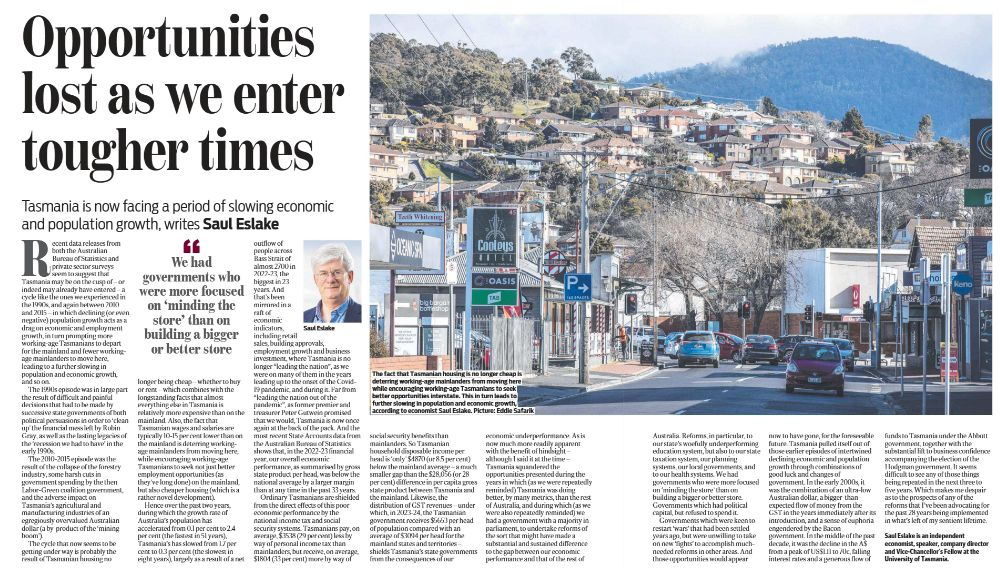Tasmania – lost opportunities
Tasmania | 12th March 2024

Recent data releases from both the Australian Bureau of Statistics and private sector surveys seem to suggest that Tasmania may be on the cusp of – or indeed may already have entered – a cycle like the ones we experienced in the 1990s, and again between 2010 and 2015 – in which declining (or even negative) population growth acts as a drag on economic and employment growth, in turn prompting more working-age Tasmanians to depart for the mainland and fewer working-age mainlanders to move here, leading to a further slowing in population and economic growth, and so on.
The 1990s episode was in large part the result of difficult and painful decisions which had to be made by successive state governments of both political persuasions in order to ‘clean up’ the financial mess left by Robin Gray, as well as the lasting legacies of the ‘recession we had to have’ in the early 1990s. The 2010-2015 episode was the result of the collapse of the forestry industry, some harsh cuts in government spending by the then Labor-Green coalition government, and the adverse impact on Tasmania’s agricultural and manufacturing industries of an egregiously over-valued Australian dollar (a by-product of the ‘mining boom’).
The cycle that now seems to be getting under way is probably the result of Tasmanian housing no longer being cheap – whether to buy or rent – which, when combined with the long-standing facts that almost everything else in Tasmania is relatively more expensive than on the mainland, while wages and salaries are typically 10-15% lower than on the mainland – is deterring working-age mainlanders from moving here, whilst encouraging working-age Tasmanians to seek not just better employment opportunities (as they’ve long done) on the mainland, but also cheaper housing (which is a rather novel development).
Hence over the past two years, during which the growth rate of Australia’s population has accelerated from 0.1% to 2.4% (the fastest in 51 years), Tasmania’s has slowed from 1.7% to 0.3% (the slowest in eight years), largely as a result of a net outflow of people across Bass Strait of almost 2,700 in 2022-23, the biggest in 23 years. And that’s been mirrored in a raft of economic indicators, including retail sales, building approvals, employment growth and business investment, where Tasmania is no longer “leading the nation”, as we were on many of them in the years leading up to the onset of the Covid-19 pandemic, and during it.
Far from “leading the nation out of the pandemic”, as former Premier and Treasurer Peter Gutwein promised that we would, Tasmania is now once again at the back of the pack.
And the most recent State Accounts data from the Australian Bureau of Statistics show that, in the 2022-23 financial year, our overall economic performance, as summarised by gross state product per head, was below the national average by a larger margin than at any time in the past 33 years.
Ordinary Tasmanians are shielded from the direct effects of this poor economic performance by the national income tax and social security systems. Tasmanians pay, on average, $3,538 (29%) less by way of personal income tax than mainlanders, but receive, on average, $1,804 (33%) more by way of social security benefits than mainlanders.
So Tasmanian household disposable income per head is ‘only’ $4,870 (or 8½%) below the mainland average – a much smaller gap than the $28,056 (or 28%) difference in per capita gross state product between Tasmania and the mainland.
Likewise, the distribution of GST revenues – under which, in 2023-24, the Tasmanian Government receives $5,653 per head of population compared with an average of $3,094 per head for the mainland states and territories – shields Tasmania’s state governments from the consequences of our economic under-performance.
As is now much more readily apparent with the benefit of hindsight – although I said it at the time – Tasmania squandered the opportunities presented during the years in which (as we were repeatedly reminded) Tasmania was doing better, by many metrics, than the rest of Australia, and during which (as we were also repeatedly reminded) we had a government with a majority in Parliament, to undertake reforms of the sort that might have made a substantial and sustained difference to the gap between our economic performance and that of the rest of Australia. Reforms, in particular, to our state’s woefully under-performing education system, but also to our state taxation system, our planning systems, our local governments, and to our health systems.
We had governments who were more focussed on ‘minding the store’ than on building a bigger or better store. Governments which had political capital, but refused to spend it. Governments which were keen to restart ‘wars’ that had been settled years ago, but were unwilling to take on new ‘fights’ to accomplish much-needed reforms in other areas.
And those opportunities would appear now to have gone, for the foreseeable future.
Tasmania pulled itself out of those earlier episodes of intertwined declining economic and population growth through combinations of good luck and changes of government. In the early 2000s, it was the combination of an ultra-low Australian dollar, a bigger-than-expected flow of money from the GST in the years immediately after its introduction, and a sense of euphoria engendered by the Bacon Government. In the middle of the past decade, it was the decline in the A$ from a peak of US$1.11 to 70 cents, falling interest rates and a generous flow of funds to Tasmania under the Abbott Government, together with the substantial lift to business confidence accompanying the election of the Hodgman Government.
It seems difficult to see any of those things being repeated in the next three to five years. Which makes me despair as to the prospects of any of the reforms that I’ve been advocating for the past 28 years being implemented in what’s left of my sentient lifetime.